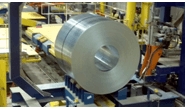Government/Policy

May 22, 2018
Commerce Applies Duties on Vietnamese Steel Linked to China
Written by Tim Triplett
Marking a win for U.S. steelmakers, the Commerce Department on Monday officially slapped duties on corrosion-resistant steel (CORE) and certain cold rolled steel products imported from Vietnam that were produced from substrate originating in China. Commerce determined that even though the products underwent some processing in Vietnam, they should still be subject to the same antidumping and countervailing duty orders as if they had been exported directly from China.
Domestic steelmakers who filed the case argued China was seeking to circumvent U.S. duties by shipping steel through a third country, in this case Vietnam. Shipments of CORE from Vietnam to the United States increased from $2 million to $80 million after preliminary duties were imposed on Chinese products in 2015. Likewise, shipments of cold-rolled steel from Vietnam to the United States increased from $9 million to $215 million.
U.S. law provides that Commerce may find circumvention of AD/CVD orders when merchandise that is the same class or kind as merchandise subject to existing orders is completed or assembled in a third country prior to importation into the United States.
Customs and Border Protection will continue to collect AD and CVD cash deposits on imports of CORE produced in Vietnam using Chinese-origin substrate at antidumping rates of 199.43 percent and countervailing duty rates of 39.05 percent. CBP will also collect cash deposits on imports of cold-rolled steel produced in Vietnam using Chinese-origin substrate at antidumping rates of 199.76 percent and countervailing duty rates of 256.44 percent. These cash deposit rates were previously established in the AD and CVD investigations on cold-rolled steel and CORE from China. Cash deposits will apply to all unliquidated entries on or after Nov. 4, 2016, the date the inquiries were initiated, Commerce said.
Importers and exporters of Vietnamese merchandise that is produced from substrate originating in Vietnam or a third-country have the option of seeking an exemption from cash deposits by certifying that the substrate originated outside of China.
The trade case was originally filed by domestic producers Steel Dynamics, Inc., California Steel Industries, AK Steel Corp., ArcelorMittal USA, Nucor Corp. and United States Steel Corp.
The duties on CORE and cold rolled from Vietnam come in addition to a 25 percent tariff resulting from the Trump administration’s Section 232 national security investigation.







